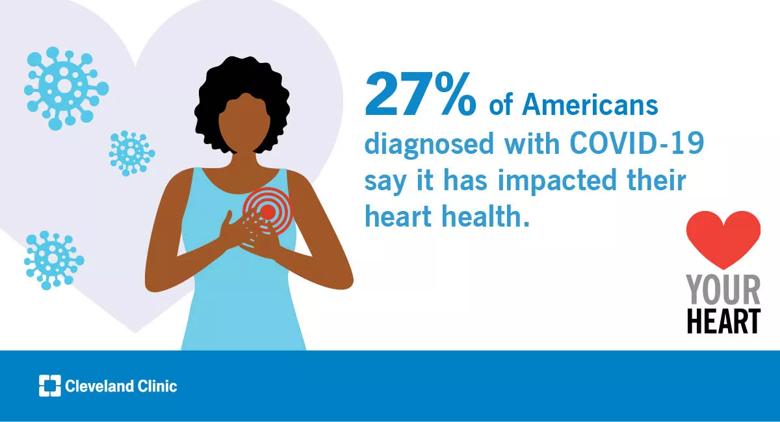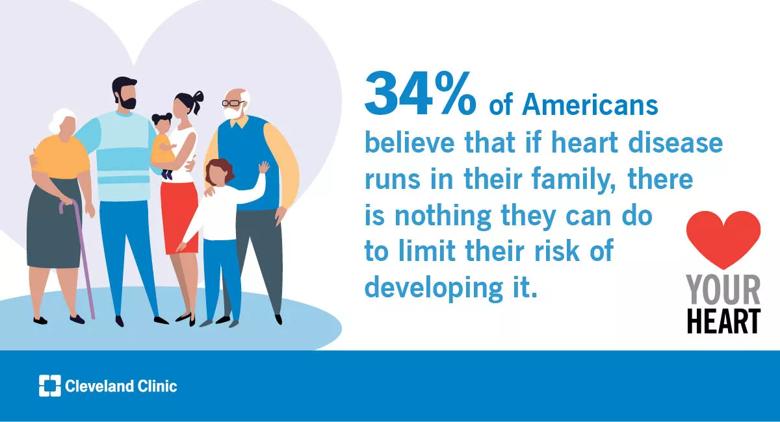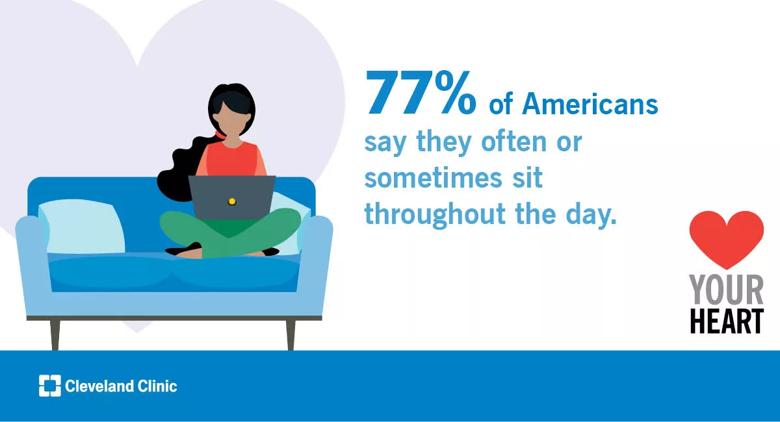Survey also finds one in four COVID-19-positive Americans report that their diagnosis has impacted their heart health
Content is property of Cleveland Clinic and for news media use only.

A Cleveland Clinic survey finds 41% of Americans have experienced at least one heart-related issue since the beginning of the COVID-19 pandemic in early 2020, with top issues including shortness of breath (18%), dizziness (15%), increased blood pressure (15%) and chest pain (13%). In addition, about one in four Americans (27%) who have tested positive for COVID-19 report that their diagnosis has impacted their heart health.

Image content: This image is available to view online.
View image online (https://assets.clevelandclinic.org/transform/7753d53f-5f4e-4e35-acc0-f0a04af82be9/22-CCC-2649658-Heart-Month-Infographics-social-2-1200x650-1_jpg)
As the world nears the two-year anniversary of the pandemic, Americans are facing consequences to their health habits that may have a negative effect on their heart health. According to the survey, sitting throughout the day is on the rise (+5 points in percentage of Americans who say they often do this) while walking throughout the day has declined (-4 points in percentage of Americans who say they often do this). Americans now say that they often or sometimes sit throughout the day (77%).
The survey also found that few Americans (22%) know that the Mediterranean diet is heart healthy, and about half of Americans (51%) do not currently follow a specific diet plan.

Image content: This image is available to view online.
View image online (https://assets.clevelandclinic.org/transform/71af703c-51b4-4a84-8464-d3c55f020171/22-CCC-2649658-Heart-Month-Infographics-social-3-1200x650-1_jpg)
“COVID fatigue is a very real thing – and for this year’s survey we wanted to see what kind of effect the ongoing pandemic is having on Americans’ heart health and in particular their healthy habits,” said Samir Kapadia, M.D., chairman of Cardiovascular Medicine at Cleveland Clinic. “We know 90% of heart disease is preventable through a healthier diet, regular exercise, and not smoking, so now is the time to refocus on our heart health.”
When it comes to genetics, 40% of those who have lost a family member to heart disease before the age of 60 have never been screened for the condition they lost a family member to, which jumps to 54% among millennials. Additionally, 34% of Americans feel that if they have a family history of heart disease, there is nothing they can do to limit the risk of developing that heart condition; however, physicians believe that early screening and treatment can save lives.
Finally, about one-third of Americans don’t know that the following factors can increase your risk of developing heart disease:

Image content: This image is available to view online.
View image online (https://assets.clevelandclinic.org/transform/9cfe6e81-fc38-4e05-aeff-5c9e857087d4/22-CCC-2649658-Heart-Month-Infographics-social-1-1200x650-1_jpg)
A positive survey result was that many Americans (77%) are familiar with their family history of heart disease and roughly two-thirds (65%) say they have had their blood pressure checked within the last six months.
The survey was conducted as part of Cleveland Clinic Heart, Vascular and Thoracic Institute’s “Love your Heart” consumer education campaign in celebration of American Heart Month. Cleveland Clinic has been ranked the No. 1 hospital in the country for cardiology and cardiac surgery for 27 years in a row by U.S. News & World Report.
For more information, go to: clevelandclinic.org/loveyourheart
| Key Findings of Cleveland Clinic’s 2022 Heart Health Survey |
|---|
| Key Findings of Cleveland Clinic’s 2022 Heart Health Survey |
Findings of an online survey conducted among a national sample consisting of 1,000 general population Americans, 18 years of age and older, living in the continental United States.
The total general population sample data was weighted to be nationally representative based on age, gender, ethnicity, region, urban vs. rural, household income and educational attainment census data. The online survey was conducted by Lucid and completed between November 8th and November 26th. The margin of error for the total sample at the 95% confidence level is +/- 3 percentage points.
Feeling disconnected and worrying about the health of loved ones during the pandemic has had a profound impact on stress levels.
Millennials’ stressors during the pandemic are particularly unique as they balance young children at home.
The pandemic hasn’t just impacted mental health – it has led to worsening physical health habits as well, including diet and exercise.
| Often do each of the following activities in an average week | Before Pandemic | Now | % Point Change |
|---|---|---|---|
| Sitting throughout the day | 33% | 38% | +5 |
| Walking throughout the day | 40% | 36% | -4 |
| Often do each of the following activities in an average week | |||
| Sitting throughout the day | |||
| Before Pandemic | |||
| 33% | |||
| Now | |||
| 38% | |||
| % Point Change | |||
| +5 | |||
| Walking throughout the day | |||
| Before Pandemic | |||
| 40% | |||
| Now | |||
| 36% | |||
| % Point Change | |||
| -4 |
Cleveland Clinic is a nonprofit multispecialty academic medical center that integrates clinical and hospital care with research and education. Located in Cleveland, Ohio, it was founded in 1921 by four renowned physicians with a vision of providing outstanding patient care based upon the principles of cooperation, compassion and innovation. Cleveland Clinic has pioneered many medical breakthroughs, including coronary artery bypass surgery and the first face transplant in the United States. Cleveland Clinic is consistently recognized in the U.S. and throughout the world for its expertise and care. Among Cleveland Clinic’s 82,600 employees worldwide are more than 5,786 salaried physicians and researchers, and 20,700 registered nurses and advanced practice providers, representing 140 medical specialties and subspecialties. Cleveland Clinic is a 6,728-bed health system that includes a 173-acre main campus near downtown Cleveland, 23 hospitals, 280 outpatient facilities, including locations in northeast Ohio; Florida; Las Vegas, Nevada; Toronto, Canada; Abu Dhabi, UAE; and London, England. In 2024, there were 15.7 million outpatient encounters, 333,000 hospital admissions and observations, and 320,000 surgeries and procedures throughout Cleveland Clinic’s health system. Patients came for treatment from every state and 112 countries. Visit us at clevelandclinic.org. Follow us at x.com/CleClinicNews. News and resources are available at newsroom.clevelandclinic.org.
Editor’s Note: Cleveland Clinic News Service is available to provide broadcast-quality interviews and B-roll upon request.